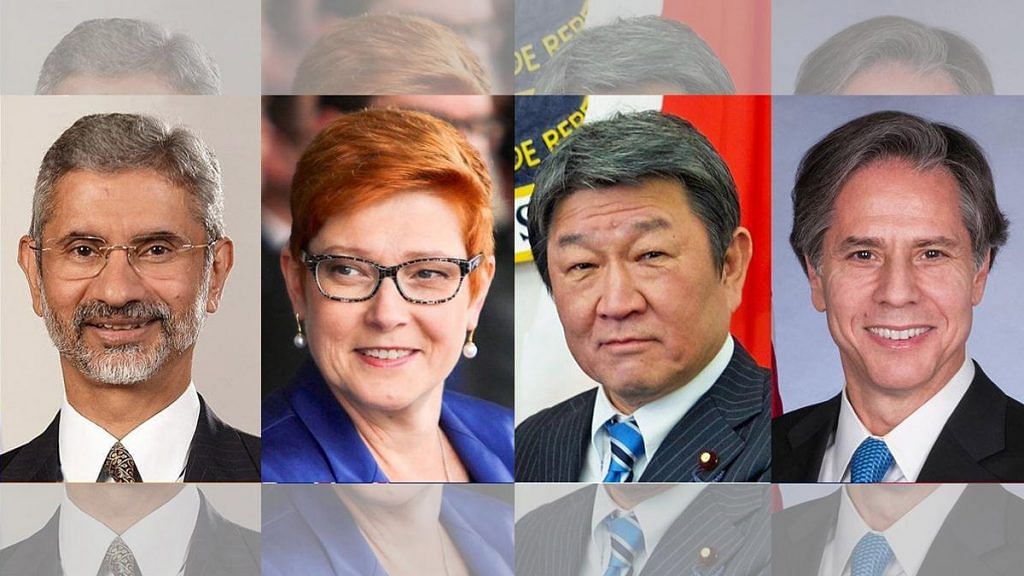New Delhi: India and the other Quad member countries Thursday stressed that they are committed to a “rules-based international order, underpinned by respect for territorial integrity and sovereignty”.
They also added that changes in the world make a strong case for them to work closely together. The virtual meeting of the four Quad nations — India, US, Australia and Japan — comes amid the ongoing disengagement process between Indian and Chinese troops at the Pangong Tso in Ladakh. India and China were locked in a bitter border standoff that began in April-May 2020.
“The ministers emphasised their commitment to upholding a rules-based international order, underpinned by respect for territorial integrity and sovereignty, rule of law, transparency, freedom of navigation in the international seas and peaceful resolution of dispute,” said a statement issued by the Ministry of External Affairs (MEA).
The statement added that the ministers highlighted their shared attributes as political democracies, market economies and pluralistic societies.
“They recognised that the changes underway in the world makes a strong case for their countries working closely together,” the statement added. “It was important for the international community that the direction of changes remains positive and beneficial to all.”
The meeting was held between External Affairs Minister S. Jaishankar, US Secretary of State Antony Blinken, Japan’s Minister of Foreign Affairs Motegi Toshimitsu, and Marise Payne, Minister for Foreign Affairs of Australia. The Quad ministerial is an informal group of four countries.
“Just concluded the Quad Foreign Ministerial Meeting with Australia, Japan and the US. Our positive agenda underlines our shared commitment to global good,” Jaishankar tweeted. “Exchanged perspectives on regional issues across the Indo-Pacific. Highlighted practical cooperation in different domains to give our agenda a concrete shape,” he said.
In an effort to expand the concept and framework of Indo-Pacific, the Quad countries also discussed the role of ASEAN in the initiative and the fact that European countries are also coming out with their own concept of Indo-Pacific.
In a statement, Payne said they discussed the “increasingly complex strategic challenges facing the region, and the growing pressures on rules, norms and institutions”.
Also read: Vaccine diplomacy in play as Modi gets call from ‘friend’ Trudeau, promises shots Canada wants
US aims to deepen Quad cooperation
The US Secretary of State, Antony Blinken, tweeted that Washington looks forward to the “deepening” of cooperation between the Quad countries under the present format.
“I had the pleasure to speak with my Quad counterparts @MarisePayne, @moteging, and @DrSJaishankar. I look forward to deepening our cooperation on climate change and COVID-19, supporting ASEAN centrality, and advancing our vision of a free and open Indo-Pacific,” Blinken tweeted.
Japan’s Foreign Minister Motegi Toshimitsu expressed “serious concern” on China’s Coast Guard Law even as the member nations all concurred to “strongly oppose unilateral and forceful attempts to change the status quo in the context of the East and South China Sea”.
The US, along with the rest of the Quad partners, also highlighted the “need to restore the democratically elected government in Burma, and the priority of strengthening democratic resilience in the broader region”.
Myanmar has been under a military coup since 1 February even as the armed forces there have been tightening their grip in the country.
No decision on Quad summit meeting
This time expectations were high that the Quad foreign ministers might decide to elevate their cooperation to the summit level after the US proposed a meeting of all the leaders of the member countries thereby making it more formal and institutional.
Ahead of the Quad meet, the Pentagon Wednesday stated that India is a “critical partner, especially when you consider all of the challenges in the Indo-Pacific region.”
Hours before the meeting, Prime Minister Narendra Modi also held talks with his Australian counterpart Scott Morrison reiterating their common objective towards the Indo-Pacific strategic initiative.
“Spoke with my good friend PM @ScottMorrisonMP today. Reiterated our commitment to consolidating our Comprehensive Strategic Partnership. Also discussed regional issues of common interest. Look forward to working together for peace, prosperity and security in the Indo-Pacific,” Modi tweeted Thursday.
However, no formal decision to hold the proposed Quad Summit was announced in this meeting. “They reiterated their commitment to the Quad meeting at least annually at the Ministerial level and on a regular basis at senior and working levels to strengthen cooperation on advancing a free and open Indo-Pacific region, including support for freedom of navigation and territorial integrity,” the US State Department said.
The first round of Quad foreign ministers’ meeting was held at New York in September 2019, followed by the second round that was held in-person despite the pandemic in October 2020 in Tokyo.
Last month, US National Security Adviser Jake Sullivan had said that the Quad grouping is a “foundation upon which to build substantial American policy in the Indo-Pacific region”.
Also read: India, China disengagement to conclude in 2-3 days, says Foreign Secretary Shringla
